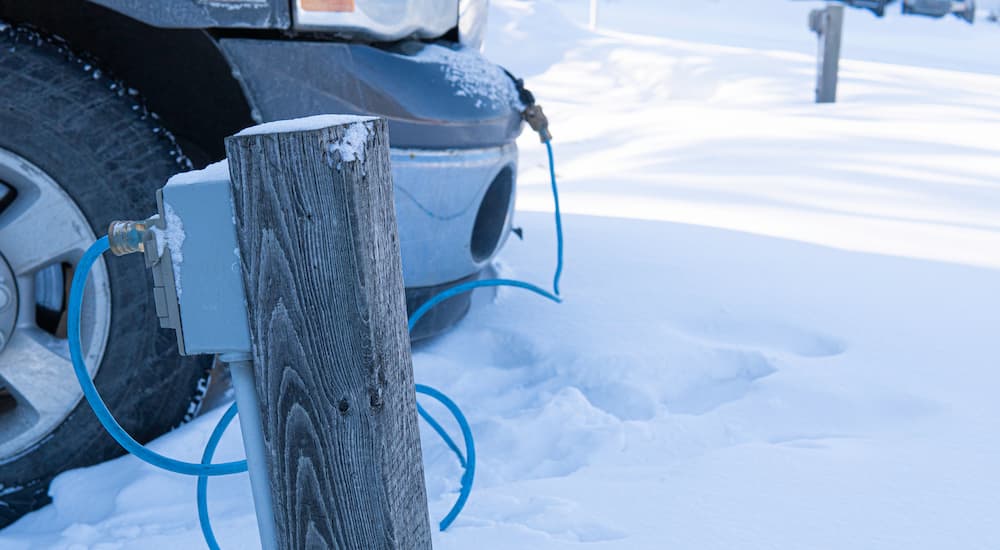Whether you’re a long-time diesel fan or recently switched from a gas-guzzling truck to a diesel-powered road warrior, it’s critical to know how to protect your truck. Diesel truck service needs are different, specifically in the winter when temperatures fall below freezing and your diesel struggles to keep up with the daily demands of the road. It sounds hard to believe, doesn’t it?
Drivers that spend most of their time in moderate climates with mild winters don’t have much to worry about as their diesel truck won’t miss a beat. However, drivers across the northern United States, and even those who occasionally fall victim to freezing temperatures, have a little more work to do. So, what does winterizing your diesel truck entail?
Check the Fuel
One of the first steps to protect your diesel truck in the winter is tuning in to your local weather station. Instead of checking for rain, sleet, or snow, be mindful of the daily temperatures, specifically the lows. Why is this important?
Diesel fuel contains paraffin wax, which improves lubrication and fuel viscosity. However, paraffin wax raises a problem when temperatures start falling toward freezing. At 32 degrees, the paraffin in the diesel begins to stiffen and cloud the fuel tank. This clouding is the earliest stage of what’s known as “diesel fuel gelling,” and although it doesn’t render the engine useless, it can impact its efficiency as it forces the engine to work harder than usual.
The paraffin wax becomes increasingly harder and denser as temperatures fall below freezing. When this occurs, the gel is so thick that it can clog the fuel filters and prevent the fuel from flowing. Without fuel making its way to the engine, your diesel truck cannot generate power and run.
Prevention
You can proactively prevent fuel gelling by frequently checking the weather and knowing the temperature for your area or where you’re traveling. One of the most popular and convenient ways to mitigate the risk of gelling is to use a diesel fuel additive before temperatures start plummeting. These additives prevent the paraffin wax from solidifying, protect the fuel injectors, and improve cold engine starts. Depending on your location, you may also find gas stations that offer diesel fuel premixed with kerosene, which lowers the temperature at which the paraffin wax starts clouding or gelling.

Check the Battery
Diesel owners know the importance of idling the engine, but as temperatures fall, you may notice the engine is labored or slow to crank. Just as cold temperatures affect diesel fuel, they also affect the battery. This is because fewer electrons develop as the ambient temperatures plummet. What does this mean for your diesel truck?
With fewer electrons, the battery struggles to produce enough current to start the engine. This loss is significant, with 32-degree temperatures yielding as much as a 20% loss in current. In many instances, the battery struggles to power the engine, leading to that heavy, labored feeling or slow initial crank or turnover.
Prevention
A battery load test can help pinpoint the issue and determine the battery’s condition. In most cases, a new battery fixes the problem. However, adding a battery warmer can prevent the issue and ensure your diesel engine starts and runs throughout the winter. Remember that a battery warmer differs from an engine block heater, a staple on most modern diesel engines that makes it easier to start in cold temperatures, reduces wear and tear, and promotes efficiency.
Check the Oil
As you check the battery and treat your diesel fuel, it’s also critical to check the oil. The thickness or viscosity of engine oil is affected by the ambient temperature. Cold, freezing temperatures cause oil to thicken, which is problematic with oils that are already thick or have a higher viscosity. How does this affect your diesel’s performance?
Oil lubricates the engine’s many moving parts, allowing the crankshaft to turn quickly to ignite the diesel fuel and power the truck. However, as the oil thickens, it becomes less effective as a lubricant, making it harder for your engine to start. It also increases the likelihood of metal-on-metal contact in the engine, increasing wear and reducing longevity.
Prevention
Engine oil, like 15W-40, is widely used and is adequate for year-round use in most areas. However, if you drive in frigid temperatures, consider changing to a thinner oil, like 5W-40 or 0W-40. With lower viscosity, these oils don’t react as dramatically to colder temperatures. Instead, an oil like 5W-40 only slightly thickens, increasing oil pressure and improving flow.

Check or Consider a Block Heater
One of the best ways to prepare your diesel truck for winter is to consider a block heater. Most modern diesel engines are equipped with block heaters, which are built-in electronic heaters that keep the engine warm when the truck is parked. If you drive an older diesel truck without a block heater, you can buy an aftermarket heater and have it installed by the trusted technicians at your service center.
Block heaters are incredibly convenient because they make it easy to winterize your truck with minimal effort. Once you park the truck, you simply plug the heater into a heavy-duty extension cord and then plug it into a 110-volt outlet. The heater will keep the engine warm while the truck is parked, making it easier to start, minimizing excessive fuel consumption, and reducing wear and tear on the engine to increase its longevity.
Energy-Saving Tips
If you’re shopping for an aftermarket block heater, it’s essential to rely on your dealership or a trusted mechanic. Why? The wattage of the heater should match the size of your engine and the climate in your area. Why is this critical? Suppose you have a smaller diesel engine or live in an area where temperatures rarely fall below zero. In this case, a high-wattage heater will work overtime and unnecessarily increase your electric bill. By relying on a heater compatible with your engine, you can mitigate the additional expense and still reap the benefits of this convenient tool.
Protecting Your Investment
Your diesel truck is likely one of your biggest financial investments. Diesel trucks aren’t cheap, but the higher initial cost doesn’t outweigh their useful towing capabilities, efficiency, longevity, and sheer on-road prowess. So whether you use the truck as your daily driver or haul heavy equipment between job sites, it’s critical to treat your diesel truck like an investment and do everything in your power to protect and extend its longevity.
Protecting your investment means taking care of your diesel truck before winter arrives. Frigid temperatures affect every aspect of your truck, from your tires losing air pressure to fluids that get thicker as temperatures fall. Your diesel engine is just as vulnerable to dramatic changes in the ambient temperature, making it essential to start preparing your truck for winter long before winter arrives.
As fall arrives and you anticipate the holidays or football season, begin monitoring the weather and watch for plummeting temperatures. Take these steps to winterize your truck and even have your service center perform a pre-winter inspection. With this assessment, you can gain insight into your truck’s condition, from the tread on your tires to the battery, fluid levels, and more. As you’ve seen, these factors are critical to how your diesel truck performs when temperatures fall, so it’s essential to be proactive to get the most out of your diesel when winter wonderland arrives.

